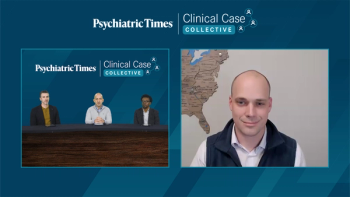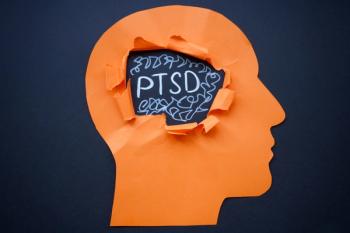
A panelist discusses how posttraumatic stress disorder (PTSD) permeates modern society at multiple levels, from individuals coping with personal trauma to collective trauma responses that shape community behaviors and social structures.

A panelist discusses how posttraumatic stress disorder (PTSD) permeates modern society at multiple levels, from individuals coping with personal trauma to collective trauma responses that shape community behaviors and social structures.

A panelist discusses how posttraumatic stress disorder (PTSD) alters key brain regions, such as the amygdala and hippocampus, with genetic predisposition, severity of trauma exposure, and lack of social support serving as critical risk factors that can influence both the likelihood of developing the condition and its neurobiological impact.

A panelist discusses how posttraumatic stress disorder (PTSD) manifests through a complex web of symptoms, including intrusive memories, nightmares, hypervigilance, emotional numbness, and avoidance behaviors that significantly impact daily functioning and quality of life.

A panelist discusses how diagnosing posttraumatic stress disorder (PTSD) presents unique challenges due to symptom overlap with other mental health conditions, varying presentation across different populations, and the often-delayed onset of symptoms following traumatic events.

A panelist discusses how clinicians employ a range of diagnostic tools for posttraumatic stress disorder (PTSD) assessment, including structured clinical interviews, standardized questionnaires such as the PCL-5, trauma screening instruments, and detailed behavioral observations to ensure accurate diagnosis and appropriate treatment planning.

A panelist discusses how a posttraumatic stress disorder (PTSD) diagnosis in clinical settings requires a comprehensive evaluation process that includes gathering detailed trauma history, assessing current symptoms through validated assessment tools, conducting differential diagnosis to rule out other conditions, and considering cultural and contextual factors that may influence symptom presentation.

A panelist discusses how treatment options for posttraumatic stress disorder (PTSD) encompass a wide range of evidence-based approaches, including trauma-focused cognitive behavioral therapy, medication management, exposure therapy, and complementary interventions such as mindfulness and group support, which can be tailored to meet individual patient needs and circumstances.

A panelist discusses how clinicians implement posttraumatic stress disorder (PTSD) treatments through a carefully structured approach that begins with establishing safety and stabilization, progresses through trauma processing using evidence-based interventions, and concludes with integration and relapse prevention strategies, all while maintaining therapeutic alliance and adjusting treatment intensity based on patient response.

A panelist discusses how emerging posttraumatic stress disorder (PTSD) treatments, including psychedelic-assisted therapy, neurofeedback, transcranial magnetic stimulation, and virtual reality exposure protocols, show promising results in clinical trials while offering new hope for treatment-resistant cases.

A panelist discusses how effective posttraumatic stress disorder (PTSD) management requires a comprehensive, individualized approach combining evidence-based treatments, ongoing support systems, lifestyle modifications, and regular monitoring of progress while acknowledging that recovery is often a gradual process requiring patience, persistence, and collaboration between health care providers and patients.

A patient discusses their struggles coming to terms with a posttraumatic stress disorder (PTSD) diagnosis after multiple traumatic events, detailing their initial resistance to seeking help, the breakthrough moments in therapy that led to acceptance, and their ongoing journey of healing through various treatment approaches.

Check out these 7 insights and perspectives on recognizing and treating PTSD.